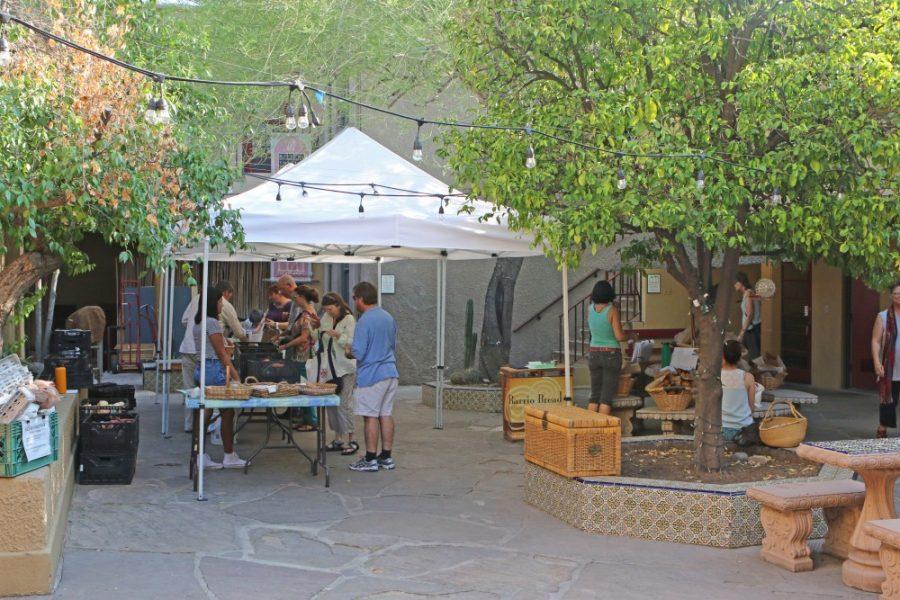As students, you’ve all been told a hundred times how important it is to be sustainable. Your gen-ed science professor preached about it, the student-run organizations tried to recruit you and even your roommate called you out for leaving the lights on in the kitchen. You’ve been asked to do everything from walking to school, to planting a garden or converting to veganism. And if you’ve actually done any of these, more power to you.
But what about the steps you can take right now, without making any drastic life changes? Sustainability doesn’t have to be complicated or costly. With that in mind, here are some simple tips for living a sustainable life this semester:
Start Small
Start with the basics: reduce, reuse, recycle. The first thing you can do to make a difference is by decreasing the amount of stuff you buy, said Sherri Ludlam, a city waste reduction specialist and the liaison with the University of Arizona’s Compost Cats.
“If you don’t buy it, you don’t waste it, then you’ve reduced your waste footprint,” Ludlum said.
There’s a reason to the rhyme “reduce, reuse and recycle.”
RELATED: Campus Guide ’17: A year of student science competitions
This is a familiar phrase for many people, but it’s important to follow the steps in that order, said Jill Burchell, senior coordinator of sustainability education in Housing and Residential Life.
“Recycling should be a last resort,” Burchell said. “You need to be thinking about reducing and reusing before you get to recycling.”
Shop Local
We’ve all been there, standing in the produce section of Whole Foods debating whether we should spend the extra $2 on organic, fair-trade bananas or go for a cheaper option.
However, the cheaper option doesn’t have to be a trade-off for quality or eco-friendliness. You can stick to your budget and your sustainability goals by purchasing your fruits and vegetables via Community Supported Agriculture, also known as a CSA.
CSA offers the richness of fresh-picked, locally grown fruits and veggies without an expensive price tag. The produce available at a CSA pickup comes from one local farm, meaning the selection is often vastly different than anything you would find in a grocery store.
“Every week for years, we would go and buy the same produce at the grocery store, organic, and it was always, always more expensive,” said Philippe Waterinckx, a UA alumnus who founded the Tucson CSA 13 years ago.
The price isn’t the only draw. The produce may look a little different than what you might find at a grocery store, but it’s likely to taste different too – in a good way.
“What you get here at the CSA is that [the produce] was harvested when it was mature, when it was ready to pick [and] at its full flavor potential, so the quality is really good and it tastes really good, too,” Waterinckx said.
Buying locally also helps reduce the use of natural resources. From farm to table, CSA produce travels far less than anything you would find in the store, meaning less fossil fuel consumption, according to Waterinckx.
However, Waterinckx issued a word of caution to anyone considering joining a CSA: It may be cheaper, but it also requires more time in the kitchen. Because there is a risk of unused produce going to waste, the CSA team is careful to provide cooking workshops, recipes and useful advice to help newcomers learn how to use the fruits and vegetables they’re unfamiliar with.
Recycle Smart
If you’re looking for just one thing to change this semester, Burchell has a suggestion for you.
“If you’re not sure if something is recyclable or not, just throw it away,” Burchell said.
Waste contamination is currently a big issue for the recycling services on campus.Hot coffee cups, styrofoam, containers containing food waste and half-full water bottles are among some of the items that are commonly mistaken as recyclable, Burchell said.
Another object that doesn’t belong in a recycling bin? Pet waste. When you take your pet outside, please remember to bring a plastic bag and deposit all animal waste in a trash can, not the blue bin, according to Ludlum.
RELATED: The flow of what’s below: A million dollar idea
According to Burchell, contaminating the recycling bins can have big consequences. If the Materials Recovery Facility receives a bag of recyclables that is too contaminated, it will just throw it away, rather than spending the extra time to sort out the usable materials.
“When you’re on campus, you’re a Wildcat, and Wildcats recycle,” Burchell said. “Wildcats do not throw trash in the recycling bin; that’s not who we are and that’s not who we want to be.”
Hopefully, you’ve found something you can do this semester to be a little more sustainable. At the very least, you can take pride in the fact that the UA received a gold rating from the Association for the Advancement of Sustainability in Higher Education this year.
Follow Hannah Dahl on Twitter









